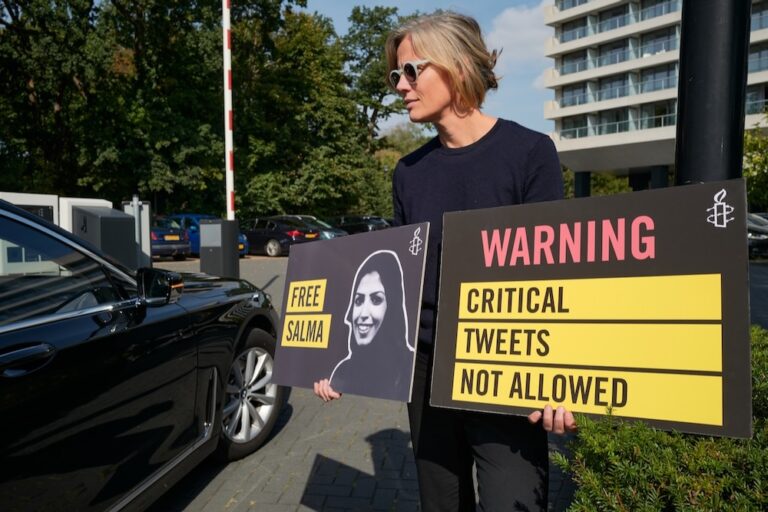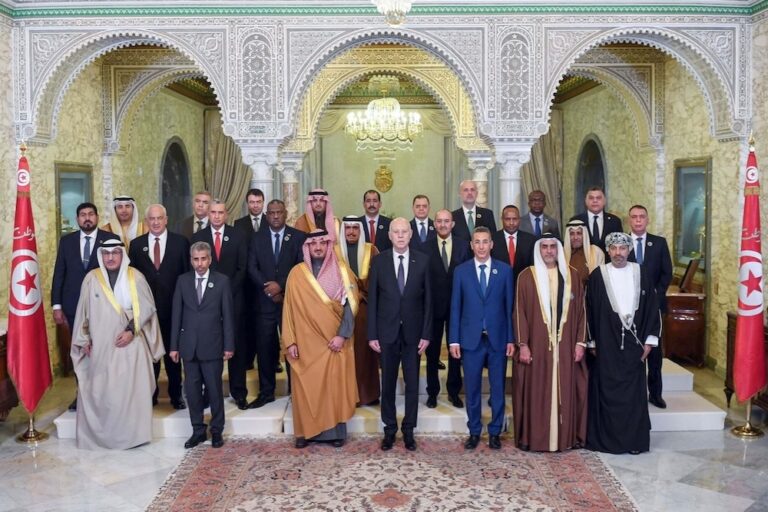October 2021 in Middle East and North Africa: A free expression roundup produced by IFEX's Regional Editor Naseem Tarawnah, based on IFEX member reports and news from the region.
An arsenal of repressive laws in Egypt entrench a permanent state of emergency. ‘Terrorism’ designation of six Palestinian organizations highlight the escalating Israeli attacks on civil society in Palestine. Continued suppression of free expression and information in Tunisia.
Egypt: A permanent state of emergency
President Abdel Fattah al-Sisi’s decision to end the country’s state of emergency that has granted him sweeping powers since April 2017 was news welcomed by rights groups and activists, who also stressed the move was far from sufficient in addressing the country’s dire human rights situation.
Indeed, an arsenal of repressive laws ushered in by Sisi’s government since the July 2013 military coup have moved to entrench a permanent state of emergency. Just weeks after the president’s announcement, parliament approved new amendments to three laws that would further seek to consolidate executive and military powers, and restrict the right to information.
Epitomizing the status quo, imprisoned activists like Alaa Abdel Fattah, blogger Mohamed Ibrahim, and human rights lawyer Mohamed al-Baqer continue to be held beyond the maximum two-year limit of their pretrial detention. Facing false news charges, the activists appeared in a state security court last month for the first trial session in over two years, and argued the illegality of their detention.
“The prosecution hasn’t questioned me about anything in my case for 23 months,” Abdel Fattah reportedly told the presiding judge. “And after 23 months, I find out that I am being accused of sharing a news item.”
IFEX members in Egypt and other rights groups condemned the move to try the activists in an exceptional court, and called the unnecessary pretrial detentions a form of open-ended punishment that sees the ‘recycling’ of detainees into new cases with new charges, in an effort to prolong their detention beyond the maximum legally-allowable duration.
Tunisia: Restricting information, and LGBTQI+ community face attacks
Both supporters and opponents of President Kais Saied’s power grab rallied in the country’s capital last month, in the midst of escalating suppression of freedom of expression and access to information. Tunisian rights groups condemned calls by former president Moncef Marzouki for foreign intervention during a rally in Paris, as well as attacks by the Islamist Ennahda Movement and its allies on journalists covering protests opposing President Saied in Tunis. Marzouki’s diplomatic passport has since been revoked, and an international arrest notice has been issued against the former leader.
Tunisian TV host and journalist Amer Ayad remains in detention for his on-air criticism of the president, and faces a number of charges in a military court trial. Privately-owned television channel Nessma TV and the privately owned radio station al-Quran al-Kareem were shut down over licensing issues, with security forces raiding the studios of both stations and confiscating their eq uipment. According to the Committee to Protect Journalists (CPJ), Tunisian authorities are using licensing procedures to control media critical of the president.
Meanwhile, the director of Tunisian LGBTQI+ rights group Damj Association for Justice and Equality, Badr Baabou, was brutally beaten by police officers who ambushed him on his way home. According to Human Rights Watch (HRW), the assault comes against a backdrop of increased attacks targeting LGBTQI+ activists by security forces in recent years.
“After they pushed me to the ground and stole my devices, the police officers repeatedly punched and kicked me,” Baabou told HRW. “One placed his boot on my neck so I would stop screaming. I couldn’t breathe.”
Palestine: ‘Terrorism’ designations and content suppression
Rights groups called Israel’s recent designation of several Palestinian human rights groups as “terrorist organizations” an internationally wrongful act, and called on the international community to support Palestinian civil society and human rights defenders amidst escalating attacks on their work.
The designation was announced by Israeli Defence Minister Benny Gantz on 19 October and targeted six Palestinian civil society organizations under Israel’s notorious 2016 Anti-Terrorism Law – in a move rights groups say signifies “an alarming escalation that threatens to shut down the work of Palestine’s most prominent civil society organizations”.
In the online civic space, pressure has been mounting on Facebook to act on its oversight board’s recent decision regarding the company’s censorship and suppression of pro-Palestinian content and discussion on its platform, including the documentation of Israeli human rights abuses. A recent leak of internal company documents shed light on the extent of Facebook’s systemic censorship of Palestinian voices, pointing to a flawed content moderation system and a lack of Arabic-speaking content moderators.
In a bid to more effectively monitor, document, and appeal digital rights violations against Palestinians, IFEX member the Arab Center for the Advancement of Social Media (7amleh) launched a new platform called 7or (‘hurr’). The platform allows users to report various violations, such as content takedowns and account suspensions, and for the digital rights organization to hold social media companies accountable.
Iran: Women journalists targeted at home and beyond
Rights groups have expressed concern over cruel and degrading mistreatment and abuse faced by imprisoned journalists, including denying them medical care, contact with family, and visiting rights.
Two women freelance journalists and a jailed photojournalist’s mother were also ordered to begin serving prison sentences last month. According to Reporters Without Borders (RSF), Farangis Mazloom, the mother of Soheil Arabi, an RSF Press Freedom Prize winning photojournalist, was ordered to begin a one-year jail sentence she received last March on charges of “meeting and plotting against national security” and “anti-government propaganda”.
Beyond Iran’s borders, women journalists in the diaspora have also been targeted for their critical work. In a recent collaborative briefing, IFEX members ARTICLE 19 and CPJ examined the toxic and violent space women journalists reporting on Iran face.
“Covering Iran, even from outside the country, can be a dangerous beat for any journalist,” said Sherif Mansour, CPJ’s MENA Program Coordinator. “For women journalists in exile, the burden of fearing for their lives is amplified by smear campaigns and relentless online abuse. Protection by law enforcement and support from social media platforms are critical for them to carry out their work with any sense of safety.”
In Brief:
Saudi Arabia: The recent Saudi takeover of the Premier League football club Newcastle United called attention to Saudi Arabia’s ongoing strategy of ‘sportswashing’ its appalling human rights record. News of the reported US$400 million by the Saudi sovereign wealth fund comes as the rights community marked the third anniversary of Saudi journalist Jamal Khashoggi’s brutal murder, where justice will not be achieved until those who ordered his killing are held accountable.
Underscoring the kingdom’s callous human rights record and state of free expression, last month saw the shocking death of jailed dissident and cleric, Musa al-Qarni, from severe beatings and torture while in detention, as well as the unjust 20-year sentencing of human rights worker Abdelrahman Al-Sadhan upheld by an appeals court. In a rare spot of welcome news, Ali al-Nimr, a teenage protester arrested in 2012 during anti-government protests, was finally released after nine years.
UAE: IFEX joined regional members and rights groups on 14 October for an Alternative Human Rights Expo and continued to call for the release of imprisoned Emirati human rights defenders. Launched to counter official narratives during the ongoing Dubai Expo, the alternative event featured human rights defenders, poets, artists, musicians, and writers from across the region, who paid tribute to the creative work of imprisoned activists in the UAE and wider region, including human rights defender and poet, Ahmed Mansoor.
Lebanon: As the victims of the Beirut Port blast await justice from an investigation that continues to face roadblocks, rights groups came together last month to emphasize the need for an independent judiciary and an independent media delivering accurate information on the judicial proceedings.
“Public opinion and the families of victims not only rely on the judiciary to bring them justice; they also rely on the media to accompany them on the path towards uncovering the truth and achieving justice,” said Tony Mikhael from Maharat Foundation.



